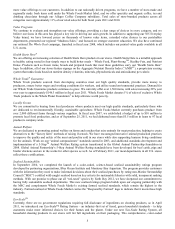Whole Foods 2011 Annual Report Download - page 21
Download and view the complete annual report
Please find page 21 of the 2011 Whole Foods annual report below. You can navigate through the pages in the report by either clicking on the pages listed below, or by using the keyword search tool below to find specific information within the annual report. 15
Responding to such organization attempts is distracting to management and team members and may have a negative financial
impact on a store, facility or the Company as a whole.
Unfavorable changes in governmental regulation could harm our business.
The Company is subject to various international, federal, state and local laws, regulations and administrative practices
affecting our business, and we must comply with provisions regulating health and sanitation standards, food labeling, equal
employment, minimum wages, and licensing for the sale of food and, in some stores, alcoholic beverages. Our new store
openings could be delayed or prevented or our existing stores could be impacted by difficulties or failures in our ability to
obtain or maintain required approvals or licenses. Changes in existing laws or implementation of new laws, regulations and
practices (e.g., health care reform and/or “card check” legislation) could have a significant impact on our business.
The USDA’ s Organic Rule facilitates interstate commerce and the marketing of organically produced food, and provides
assurance to our customers that such products meet consistent, uniform standards. Compliance with this rule could pose a
significant burden on some of our suppliers, which may cause a disruption in some of our product offerings.
We cannot predict the nature of future laws, regulations, interpretations or applications, or determine what effect either
additional government regulations or administrative orders, when and if promulgated, or disparate federal, state and local
regulatory schemes would have on our business in the future. They could, however, require the reformulation of certain
products to meet new standards, the recall or discontinuance of certain products not able to be reformulated, additional
recordkeeping, expanded documentation of the properties of certain products, expanded or different labeling and/or scientific
substantiation. Any or all of such requirements could have an adverse effect on our operating results.
The risk associated with doing business in other countries could materially impact our results of operations.
Though only 3.1% of our total sales in fiscal year 2011, the Company’ s international operations are subject to certain risks of
conducting business abroad, including fluctuations in foreign currency exchange rates, changes in regulatory requirements,
and changes or uncertainties in the economic, social and political conditions in the Company’ s geographic areas, among
other things.
We may be unable to adequately protect our intellectual property rights, which could harm our business.
We rely on a combination of trademark, trade secret and copyright law and internal procedures and nondisclosure
agreements to protect our intellectual property. There can be no assurance that our intellectual property rights can be
successfully asserted in the future or will not be invalidated, circumvented or challenged. In addition, the laws of certain
foreign countries in which our products may be produced or sold do not protect our intellectual property rights to the same
extent as the laws of the United States. Failure to protect our proprietary information could have a material adverse effect on
our business.
Effective tax rate changes and results of examinations by taxing authorities could materially impact our results of
operations.
Our future effective tax rates could be adversely affected by the earnings mix being lower than historical results in states or
countries where we have lower statutory rates and higher-than-historical results in states or countries where we have higher
statutory rates, by changes in the valuation of our deferred tax assets and liabilities, or by changes in tax laws or
interpretations thereof. In addition, we are subject to periodic audits and examinations by the Internal Revenue Service
(“IRS”) and other state and local taxing authorities. Our results could be materially impacted by the determinations and
expenses related to proceedings by the IRS and other state and local taxing authorities. See Note 10 to the consolidated
financial statements, “Income Taxes,” in “Item 8. Financial Statements and Supplementary Data.”
Disruptions in our information systems could harm our ability to run our business.
We rely extensively on information systems for point-of-sale processing in our stores, supply chain, financial reporting,
human resources and various other processes and transactions. Our information systems are subject to damage or interruption
from power outages, computer and telecommunications failures, computer viruses, security breaches, including breaches of
our transaction processing or other systems that could result in the compromise of confidential customer data, catastrophic
events, and usage errors by our team members. If our systems are breached, damaged or cease to function properly, we may
have to make significant investments to fix or replace them, suffer interruptions in our operations, face costly litigation, and
our reputation with our customers may be harmed. Any material interruption in our information systems may have a material
adverse effect on our operating results.
A failure of our internal control over financial reporting could materially impact our business or stock price.
The Company’ s management is responsible for establishing and maintaining adequate internal control over financial
reporting. An internal control system, no matter how well designed and operated, can provide only reasonable, not absolute,
assurance that the objectives of the control system are met. Further, the design of a control system must reflect the fact that
























